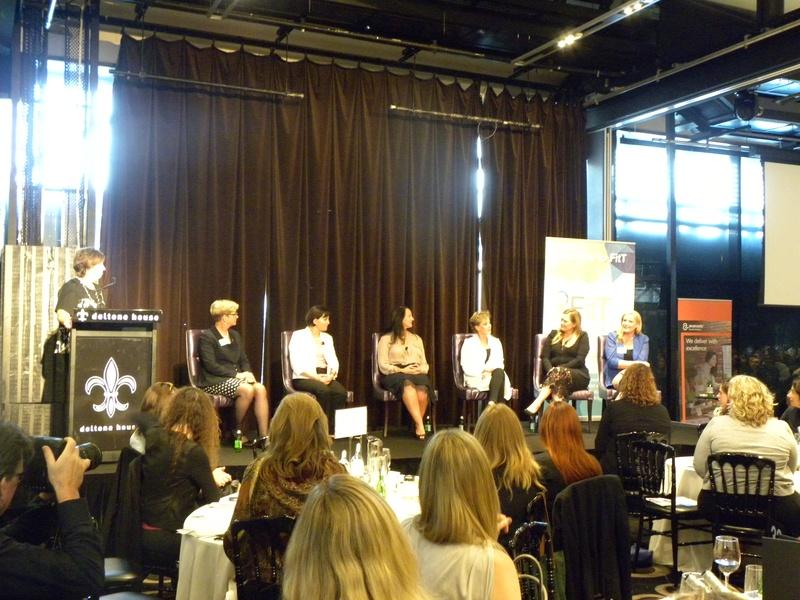
Lynwen Connick (L) with fellow FITT panellist, Susan Pond (R) (photo: Holly Morgan)
Women began dropping out of ICT roles in 1984, the same year personal computers were on the rise, according to Lynwen Connick, First Assistant Secretary - Cyber Policy and Intelligence Division, the Department of the Prime Minister and Cabinet.
Speaking as the keynote at the packed out Females in IT and Telecommunications (FITT) International Women’s Day lunch event in Sydney on Wednesday, Connick described how, when she chose to pursue a career in computer science, it was quite normal for women to work in this sector.
At the time, she said, computers were not yet being bought for the home and her only exposure to computers up until university had been on television. There was also a known history of fashionable female ICT pioneers, such as Ada Lovelace – English mathematician and countess, said to have created one of the world’s first programming languages.

“Once I got to university it was clear computing was an exciting field to study and be working in. In those days many women were working in computing, and many of the world’s ICT pioneers were women. But when I graduated something happened; it all went wrong,” said Connick.
“In 1984, the number of women studying computer science began to stagnate. Women were going into other science subjects, but computer science numbers were dropping.”
According to Connick, this also coincided with when computers were becoming popular in the home and schools had begun teaching computer science as a subject.
“I hadn't studied computing at school, and neither had half my cohort. So it must have been something in the way children were being exposed to ICT in school that was changing how they wanted to work in this field,” she concluded.
By observing the natural behaviour in her children, having both a son and a daughter, Connick said she noticed that when in preschool, all the children were gathered around computers in equal number, but by around mid-primary school it was the boys that were laughing around a screen in the classroom, while the girls instead stood outside chatting.
“At that time, personal computers, computer games, even television programs and movies, the technology in them was all marketing towards boys and men, so ICT really started to become a boy thing,” she said.
Connick made efforts to encourage her daughter to become interested in computing by buying a book that taught children how to code in Python, but this wasn’t enough to drive enthusiasm in an ICT career.
“I asked my daughter if she would consider a career in IT and she said no. I was shocked - both her parents enjoyed careers in IT, she was good at mathematics and science, so why not? And she told me, she didn’t know what a career in ICT would be like. So we failed a bit there,” she said.
Further, currently across all of Asia-Pacific, Australian girls between 15 and 19 years old are the least interested in studying or pursuing a career in STEM, according to recent research by MasterCard.
While a renewed focus on getting kids involved in STEM (science, technology, english and mathematics) subjects is very important, along with teaching young students how to code, Connick said it’s also crucial that we let kids know that there is a lot more variety to a career in ICT than just coding, particularly when programmers are often stereotyped as men in hoodies leaning over computers, in dark rooms.
“That’s some knowledge we need to impart. I’m very lucky to have an amazing job, just one of the many amazing jobs I’ve had in my career, and that’s just one example,” she said.
“I get to advise the prime minister of cyber security policy, I participate in international events, there are so many different things you can do with a career in IT and we must sell the message about how diverse our jobs are.”
The National Innovation and Science Agenda has recognised the need for a more concerted effort nationally to overcome cultural, institutional and organisational factors that discourage girls from studying STEM subjects. Last year the government pledged $13 million, budgeted over five years, to encourage more women to choose and stay in STEM research, related careers, startups and entrepreneurial firms.
The initiative includes the expansion of the Science in Australia Gender Equity pilot to cover more Australian science and research institutions; establishing a new initiative under the Male Champions of Change project to focus on STEM-based industries; and partnering with the private sector on initiatives to celebrate female STEM role models and foster interest in STEM among girls and women.

Around 600 men and women attended this year's FITT International Women's Day lunch at Doltone House in Pyrmont to discuss challenges still facing women in business and technology today, as well as applaud progress in gender equality, such as an increased percentage of women on Australian Boards in the past year.
Attendees were also able to ask questions of a panel that included Connick, Microsoft Australia managing director, Pip Marlow; SAGE steering committee co-chair, science in Australia gender equality, Susan Pond; Qlik vice president and regional director A/NZ, Sharryn Napier; GoDaddy managing director, Tara Commerford, and Intel Australia managing director, Kate Burleigh.
“Events like this are also a great way to raise awareness, build momentum and share our passion for ICT, highlight successful women in the sector, and hopefully encourage others to get involved,” said Connick.
Join the CIO Australia group on LinkedIn. The group is open to CIOs, IT Directors, COOs, CTOs and senior IT managers.
